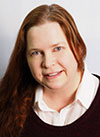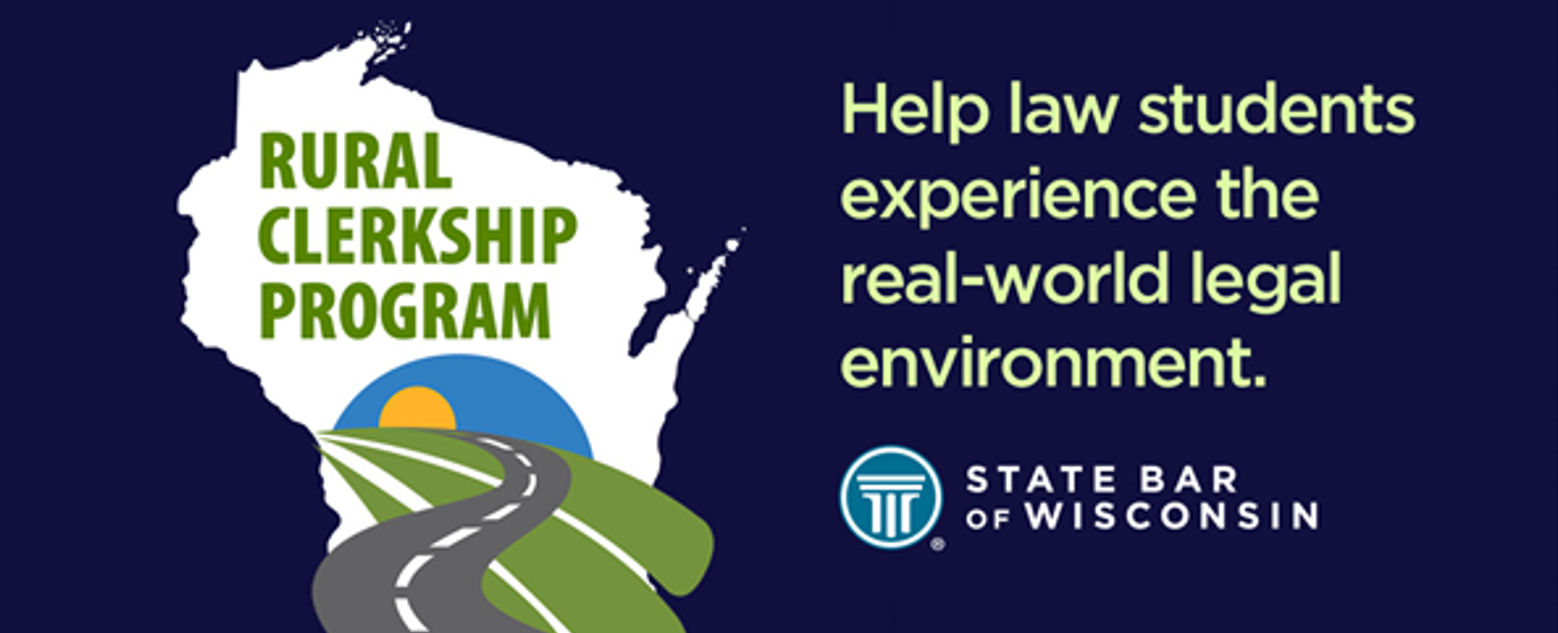
Karina O’Brien, U.W. 2014, is a managing attorney at Kostner, Koslo & Brovold LLC, in Arcadia. Her firm is a participating employer in the State Bar of Wisconsin’s Rural Clerkship Program. O’Brien was a guest on the
Bottom Up Podcast (episode 13), speaking on rural practice. She is a member of the State Bar of Wisconsin’s Bankruptcy, Insolvency & Creditors Rights, Children & the Law, and Solo Small Firm & General Practice sections and the Bar Relations Committee and is an officer in the Tri-County Bar Association.
Nov. 5, 2025 – The availability of attorneys in rural Wisconsin is a critical problem. There are simply not enough attorneys to handle the needs of rural clients.
One State Bar program hopes to help change that – the
State Bar of Wisconsin Rural Clerkship Program.
The State Bar's Rural Clerkship Program exposes students to the benefits of practicing law in rural Wisconsin by connecting students with employers offering a limited-term, full-time, paid summer employment opportunity. Employment typically lasts eight weeks, starting after the end of the spring semester.
And as the program begins its third year, it seeks employers to participate in the 2026 program – the deadline for employer submissions is Nov. 19, 2025.
A Dire Need: Jobs Are Available
Karina O’Brien, managing attorney with Kostner, Koslo & Brovold LLC in Arcadia, said the problem is much worse than when she began practice 11 years ago.
“Over the past 11 years, I have watched as my colleagues have either retired or passed away,” O’Brien said. “I believe I am currently the youngest attorney living in Buffalo County. I am also the youngest attorney in the law firms currently in Trempealeau County. I am concerned about what the practice of law in this area will look like in the next 10 years.”
Bill Grunewald is president of Jensen, Scott, Grunewald & Shiffler in Medford and Abbotsford.
“It used to be that when we sent out ads for attorneys to join our firm, we would get 40-50 resumes.,” Grunewald said. “In addition, we would often get ‘cold’ resumes. That has dramatically changed. Now we are lucky to get one resume. We are currently advertising for an attorney to join our firm in the spring of 2026. We have not received any resumes for this.”
Employers Benefit Also

Bill Grunewald is president of Jensen, Scott, Grunewald & Shiffler in Medford, Abbotsford, and Colby. His firm participated in the program’s first two years. “It has been a great experience for our firm, and I believe for the clerks. It is an opportunity for the clerks to not only learn about our communities, but also be enlightened about the depth and diversity of our practice,” he said.
Grunewald’s firm participated in the program’s first two years. “It has been a great experience for our firm, and I believe for the clerks. It is an opportunity for the clerks to not only learn about our communities, but also be enlightened about the depth and diversity of our practice,” he said.
O’Brien’s firm has also participated in the program for its first two years, and hopes to participate again in 2027. “The communities have a need for good, local attorneys. It is important to participate in the program to encourage law students to consider our area. Rural practice has so much to offer in quality of life and law practice,” she said.
About her clerk: “It was great having someone as bright as her with us. She was curious and motivated to learn. She reminded me about why the practice of law is exciting and fascinating,” O’Brien said.
It's Your Opportunity to Illustrate the Benefits of Rural Practice
The real question is, according to O’Brien, “Do I want to be a big fish in a small pond, or a small fish in a big pond?” “I have had significant opportunities to learn and grow as an attorney. I have handled many different areas and learned so much in the past 11 years just from what comes in through the door. I don’t know that I would have been as challenged or become as experienced if I was an associate working in Madison and Milwaukee,” she said.
This is a myth about rural practice, says O’Brien: “That it is slow or boring. I love that every day is different and that I have a wide variety of matters to choose from. In one day, I can work on a family law matter, guardian ad litem case, collection case, foreclosure case, estate planning matter and then wrap it up with a real estate or probate matter,” she said.
 Shannon Green is communications writer for the State Bar of Wisconsin, Madison. She can be reached by
email or by phone at (608) 250-6135.
Shannon Green is communications writer for the State Bar of Wisconsin, Madison. She can be reached by
email or by phone at (608) 250-6135.
“I believe the clerks we’ve had have been surprised by the different things our firm handles and, for lack of a better term, the ‘size’ of those matters,” Grunewald said.
The clerks not only do basic research, but also observe hearings, depositions, mediations, and client meetings, according to Grunewald. “It is our opportunity to showcase our communities and firm to the clerks with an eye that they may be a prospective attorney with us in the future. We are hopeful that the clerks appreciate the benefits of living in a small town and the passion that our firm has for serving our clients.”
Another important aspect of rural practice: The community, says O’Brien. “I love working with the people who care about me being in the area where I live. It feels good to give back to my community by navigating difficult situations with practical and sometimes creative solutions,” O’Brien said.
O’Brien has discussed the issue of the rural lawyer gap
on the Bottom Up podcast in October 2023, and
written on the topic for Wisconsin Lawyer magazine, in its March 2025 issue.
More About the State Bar Rural Clerkship Program
The State Bar Rural Clerkship Program highlights the benefits of practicing law in rural Wisconsin by connecting law students with employers offering a limited-term, full-time, paid summer employment opportunity. Employment typically lasts eight weeks, starting after the end of the spring semester.
The State Bar is currently recruiting students (1L and 2L) from Wisconsin and Minnesota law schools who are in good standing and interested in rural practice.
Which employers can participate in the program?
To participate, employers need only self-identify that they serve rural and underserved clients (that is, areas outside of Dane, Milwaukee, and Waukesha counties).
Employers conduct interviews of their candidates by mid-February.
Employers treat and pay their clerk as they would a summer associate.
For more information visit
Wisbar.org/RuralClerkship.

